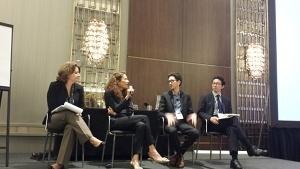
With a busy week behind you and the weekend within reach, there’s no shame in taking things a bit easy on Friday afternoon. With this in mind, every Friday TriplePundit will give you a fun, easy read on a topic you care about. So, take a break from those endless email threads, and spend five minutes catching up on the latest trends in sustainability and business.
Two years ago, shortly after the 2012 BSR Conference in New York, Hurricane Sandy struck the city. Few anticipated the severity of the damage brought on by rising floodwaters, which reached 17 feet in some areas. Gov. Andrew Cuomo estimated that the total price tag for the storm will reach $42 billion, the New York Times reported.
The unforeseen and catastrophic damage caused by Sandy serves as a chilling reminder that unplanned events lurk around every corner -- that everything can change in the blink of an eye.
As our planet warms, studies show such unprecedented storms, hurricanes and floods will only become more commonplace. But of course, natural disasters aren't the only unexpected events that can shake people -- and businesses -- to their core. From stock market jolts and dislocation to man-made tragedies like the Rana Plaza factory collapse in Bangladesh, such shocks to the system come in many forms -- and businesses are now expected to plan for the unplanned and to jump into action when disaster strikes the communities in which they operate.
At the 2014 BSR Conference, a group of though leaders assembled to discuss just that in a panel entitled "Planning for the Unplanned: The Role of Corporate Responsibility in Unforeseen Events." We pulled some of our favorite quotes from the panel, so you can feel like you were there -- even if you couldn't make it to New York.
During the panel, Koichi Kaneda, senior director of corporate social responsibility for Takeda Pharmaceutical, relayed his company's response to the 2011 Tōhoku earthquake in Japan -- the fourth largest in the world since record-keeping began in 1900. "From our viewpoint, we are a corporate citizen. So, I'm not sure if this is a responsibility or this is a natural reaction," Kaneda said. "As a pharmaceutical company we have an integrated thinking because our business has influence on society and the change of society influences our business. So, when something happens we have to do something."
Paul Massey, executive vice president of Weber Shandwick, shared how one of his clients, Greek yogurt giant Chobani, is tackling unrest in the Middle East, particularly in Turkey. "These are such complex, large-scale pressures that the more collaboration and discourse that can occur across corporate actors, I think the greater the level that we are able to identify viable solutions," Massey said. "Your company making progress in identifying opportunities is obviously meaningful, but the far greater force is if we can find solutions that are scalable across the industry."
An interesting addition to the discussion was Gabi Zedlmayer, vice president and chief progress officer for HP, who spoke about how the information technology revolution will forever alter the way people and businesses respond to crisis. This includes not only recovery and response, but also prevention and preparedness, she continued. For example, 24 people lost their lives to the 2013 tornado in Moore, Oklahoma because residents only had a 14 minute warning before the storm hit. Using big data solutions, HP has been able to extend warning times up to an hour in advance. "An hour in advance could be the difference between life and death," Zedlmayer said.Image by Mary Mazzoni"While technology by itself is not ever the solution, it's a phenomenal enabler," she concluded. "The betterment of society … is a responsibility that we all share. Take a step back and think about why companies exist: Companies exist to provide shareholder value but also a value for society from day one. There's no excuse nowadays to not utilize technology as an enabler.
"I think we have to do a lot better and we have to do a lot more, and the opportunities are there. So, I often say there's no excuse anymore. People cannot say it can't be done. It can be done. A lot more can be done, but we need to come together more efficiently."
Based in Philadelphia, Mary Mazzoni is a senior editor at TriplePundit. She is also a freelance journalist who frequently writes about sustainability, corporate social responsibility and clean tech. Her work has appeared in the Philadelphia Daily News, the Huffington Post, Sustainable Brands, Earth911 and the Daily Meal. You can follow her on Twitter @mary_mazzoni.

Mary has reported on sustainability and social impact for over a decade and now serves as executive editor of TriplePundit. She is also the general manager of TriplePundit's Brand Studio, which has worked with dozens of organizations on sustainability storytelling, and VP of content for TriplePundit's parent company 3BL.














